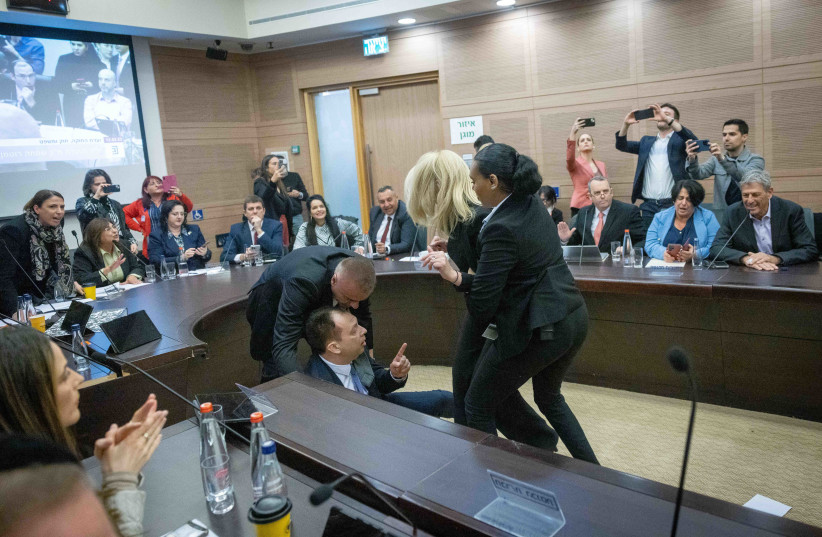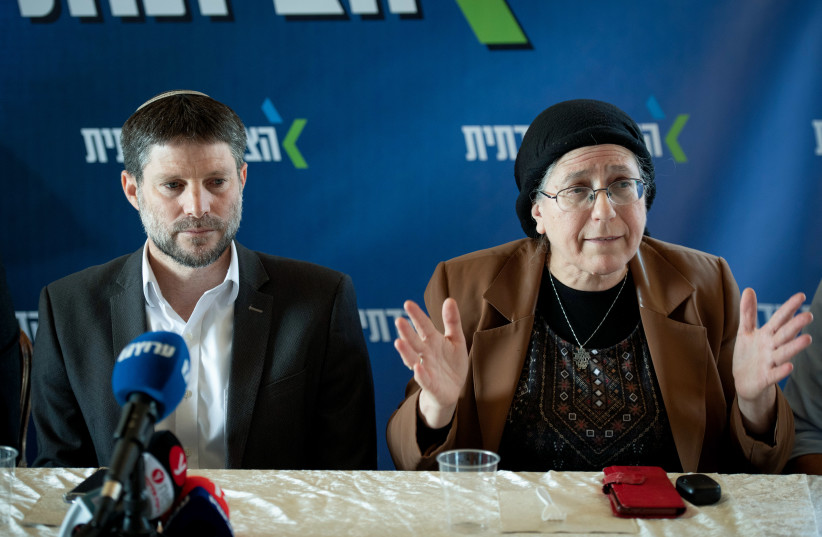One step forward, two steps back.
President Isaac Herzog has been delicately dancing all week between the coalition and the opposition, attempting to arrange a time-out in the judicial overhaul legislative race, which is escalating into a the biggest political, civil and social crisis the country has ever seen. However, every time his efforts appeared to make progress, they were stymied by communication failures.
On Sunday evening, with trembling hands, Herzog gave the speech of his lifetime, so far.
“We are on the verge of an explosion.”
Tal Shalev
“We are on the verge of an explosion,” he warned in a prime-time TV address, in which he expressed his concerns for Israel’s democratic foundations and the polarization that is eating it from within.
He almost begged the government to freeze its fraught push to revolutionize the judicial system, urged it to enter a dialogue with its adversaries and presented his own five-point plan as a framework for the negotiations.

“The time has come to lend a hand,” he ended his speech to the nation, only hours before the Knesset judiciary committee started the first votes on the reform legislation.
Herzog’s presidential plea was echoed by national figures embracing his call, from CEOs of the big banks, which issued a rare joint statement, to US Ambassador Tom Nides to Gal Gadot.
The opposition largely endorsed Herzog’s speech as well, while clinging to its first precondition: Both Yair Lapid and Benny Gantz stressed that the government needs to halt the legislation process in order to engage in meaningful negotiations. But shortly afterward, the architects of the judicial overhaul, Justice Minister Yariv Levin and Law and Knesset Constitution, Law and Justice Committee chairman Simcha Rothman, politely rejected the presidential overture and refused to put the brakes on the legislative procedures.
The morning after Herzog’s appeal for peace and reconciliation, Rothman convened his committee, as planned, to vote on the first stage of the reform legislation.
The session quickly deteriorated to one of the most violent and disgraceful shows the Knesset has ever known: Rothman massively removed the opposition MKs trying to delay the process, prompting unprecedented physical squabbles with the Knesset Guard ushers following the chairman’s orders, while young enthusiastic Yesh Atid lawmakers riotously stormed toward him, creating general mayhem.
One step forward, two steps back. Herzog’s call for partnership and building bridges was answered by a brutal confrontation.
On Tuesday evening, Herzog made another strategic move. He summoned Lapid, Gantz, and Rothman to his private Tel Aviv home, and held a marathon of separate meetings with each of them. Once again, the opposition leaders reiterated their demand that the government stop all judicial legislation, including three private bills that were scheduled for preliminary votes the following day, one of them authored by Shas leader Arye Deri, designed to bypass the High Court verdict that nixed his government post last month.
Herzog met with Deri before launching his presidential dance, and succeeded to convince him to put a temporary cap on the legislation, which is likely to lead to another constitutional confrontation with the High Court.
Rothman, the sponsor of another private bill, found an elegant technical legal excuse to pull his legislation off the plenum agenda, and the president spoke with the third legislator, Likud MK Moshe Saada, who agreed to postpone his bill as a “goodwill gesture.” It was the first positive signal of success for the president efforts. It had a short life.
Within minutes after the coalition’s first gesture, Lapid marked victory on Twitter, coining the private legislation delay as a success for the protesters. Levin and Rothman hastened to react and clarify in a joint statement that the judicial reform legislation “continues unabated,” and scheduled further committee debates next week.
Later on, Lapid complicated things even more. In a speech in the plenum, he presented his interpretation and vision of a proper presidential framework, including a 60-day halt of the legislation, which would postpone the reform until the next Knesset session and push it into the summer. Rothman dismissed Lapid immediately, stating “he lives in a movie.”
“He lives in a movie.”
Simcha Rothman
One step forward, two steps back.
The public rebuttal blame game between the coalition and the opposition over the time-out overshadowed the president’s first achievement. Technical or not, Levin and Rothman stalled their initial legislation timetable by one week, and Deri rethought his plan to bypass the court with his own private legislation. Levin and Rothman have been signaling that after the first stage of the reform passes its first reading, they will be open to compromise, supposedly opening the window for substantial negotiations later down the road.
However, most sources who are involved in the discrete discussions are not convinced about the optimism.
“The coalition is indeed willing to make significant compromises and drop some of the reform’s components, but will never abandon the core of the Levin-Rothman plan, which is a nonstarter for the opposition and the protesters,” one of them observed, adding: “It’s the judges, stupid.”
The government is determined to change the Judicial Selection Committee so that ruling politicians have full control of the process, while the politicization of the system is the biggest no-no of the anti-reform camp. Moreover, the haredi parties insist they will not give up their demand for an override clause, which would give the Knesset the power to override High Court decisions, and are threatening to leave the coalition if any concessions are made. Even if Herzog takes one or two steps forward with his efforts, at some point his delicate dance is likely to stumble on one of these steps.
Complicating the presidential efforts even more is that Prime Minister Benjamin Netanyahu is supposedly out of the game. Netanyahu, according to his confidants, is very much concerned about the broadening civil unrest and the grave economic warnings over the judicial reform, but since Attorney-General Gali Baharav-Miara barred his involvement in the judicial overhaul because of his conflict of interests due to his corruption trial, they add with an innocent face, she formally stripped him of his responsibility to steer or stop the coalition’s play.
Netanyahu fights against Smotrich, Ben-Gvir demands
Behind the scenes, Netanyahu is still very much engaged, but the prime minister’s ardent allies and proxies are bound to outflank any attempt at real compromise, strengthened by the rapturous hard-core right-wing electoral base supporting the reform.

THE PRIME MINISTER, for his part, is engaged in his own delicate dance with his far-right coalition partners, Bezalel Smotrich and Itamar Ben-Gvir, who are both issuing threats to bolt the government over its West Bank policies.
Only a month and a half since its formation, the most right-wing government ever has already evacuated several illegal Jewish settlements, broken its campaign promise to evacuate the Khan al-Ahmar village, and failed to provide an effective answer to the escalating wave of terrorism.
Netanyahu is trying to appease his partners with large-scale settlement building authorizations and unprecedented legalization of outposts, while putting his government under international scrutiny and causing tensions with the White House, but it isn’t enough.
Smotrich and Ben-Gvir, who were both promised West Bank security authorities and powers in the coalition agreements, are demanding that Netanyahu fulfill his commitments, but Defense Minister Yoav Gallant is standing in their way, refusing to break down the IDF chain of command and transfer any substantive security powers to his counterparts.
Like Herzog, Netanyahu is trying to navigate between them, one step forward, two steps back, but when he reaches the core of the conflict, he might find out there is no good way to settle the fight.
